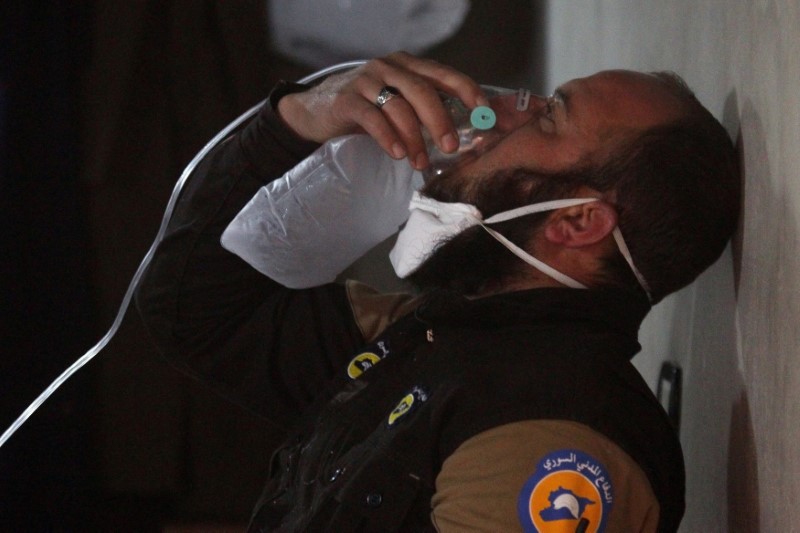By Andrew Osborn
MOSCOW (Reuters) - A deadly poison gas attack in Syria this week led TV news bulletins across the West with images of the victims -- children and adults struggling to breathe -- front and centre. In Russia, it was item 10 of 17 and the victims were not shown.
Western governments have unanimously pointed the finger at Syrian government forces for the attack. Russian state TV's flagship Vremya evening news show had another take: "Terrorists and Western countries" were wrongly trying to blame Damascus.
Vremya, which inherited its name from the Soviet Union's main evening news show, cut to a spokesman for the Russian defence ministry who said what had actually happened was that Syrian air force jets had bombed a "terrorist" bomb making factory that contained chemical weapons procured in Iraq, a version dismissed as impossible by Western countries.
Vremya's report was almost bereft of ordinary Syrians. It briefly showed an image of one woman whose hands appeared to have been damaged in a different chemical weapons attack that Russia alleged was carried out by rebels. She said nothing and betrayed no emotion.
Russia, a staunch ally of the Syrian government, has its own tragedy to focus on this week -- Monday's suspected Islamist bombing of the St Petersburg metro in which 14 were killed.
But the starkly different way Russian media reported the Syrian attack from media elsewhere underlines how far apart the Kremlin and the West remain on Syria, which could doom prospects for a U.S.-Russia detente under new President Donald Trump.
It also shows how rock solid official Russia's support for Syrian President Bashar al-Assad Russia remains. Moscow intervened on his side in September 2015, turning the tide of the conflict in his favour, and has repeatedly defended him and his government in the U.N. Security Council.
'SAY ANYTHING'
"Russian state TV will say literally anything as long as it exonerates Assad and blames the West," said Alexey Kovalev, founder of Noodle Remover, a Russian fact-checking and media analysis website that is often critical of the Kremlin.
"No matter what Assad does - he's never to blame for anything, even if it takes impossible rhetorical gymnastics."
Pro-Kremlin social media users had a different opinion.
"It's a damn lie! Assad did not use chemical weapons!" wrote one, calling herself Delia Novorusia, and posting a picture of the Syrian president proclaiming him "the great hero of the century".
Western countries believe the Kremlin maintains "troll farms" of people paid to pose as users making such posts online.
Moscow shows no sign of turning on the Syrian leader, who, although not particularly well liked in some Moscow foreign policy circles, is seen in Moscow as an anchor of stability.
A year before a presidential election which Vladimir Putin is expected to contest for his fourth term, the Kremlin is keen to bank what it sees as its foreign policy success in Syria bolstering Assad.
Since Russian forces helped Assad capture the rebel-held section of Aleppo at the end of last year in the Syrian government's biggest victory of the war, Russian state TV has downgraded its once breathless coverage of the war.
State television, which once led its reports with slick footage of Russian planes bombing Islamist positions, now usually relegates Syria to the late section of its newscast, if it is mentioned at all.
"Whenever we see Syria on the news it's about how our soldiers are handing out humanitarian aid there, about how Aleppo is being rebuilt, or how a sick Syrian child has been flown to Russia for treatment," said Elena, a student strolling in sunny central Moscow, who declined to give her surname.

"In general, there's far less of Syria on TV these days."